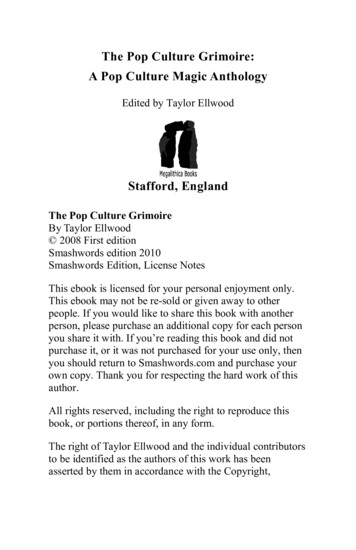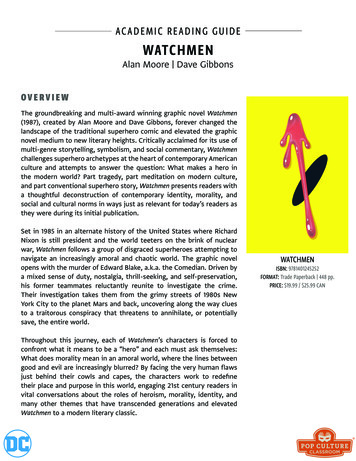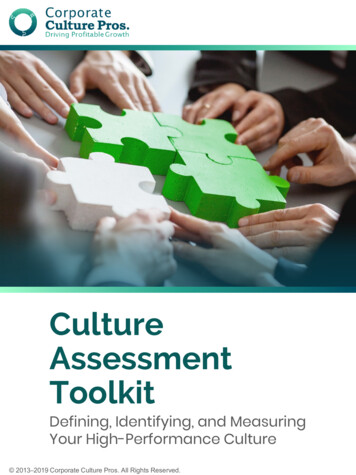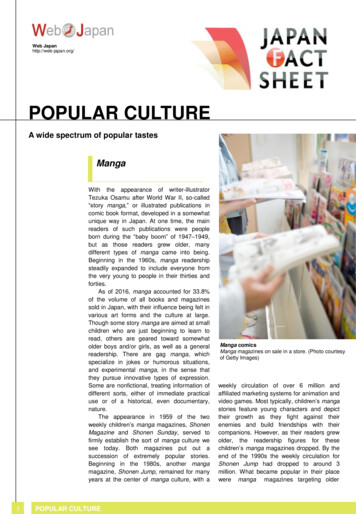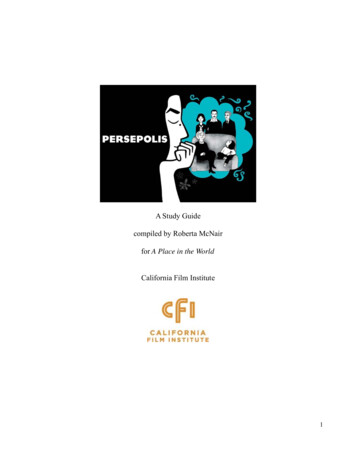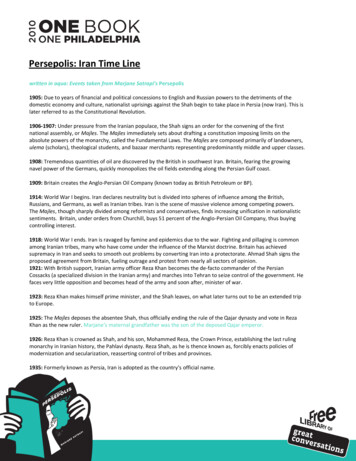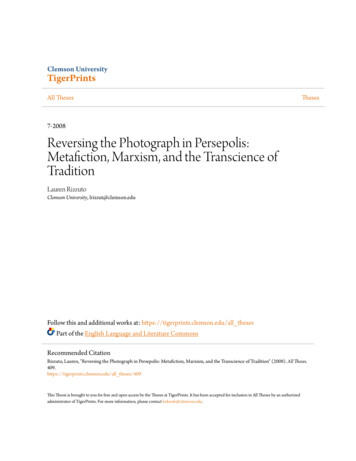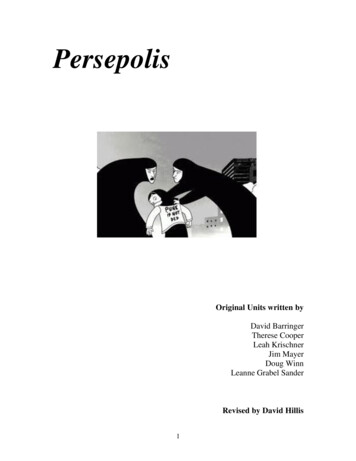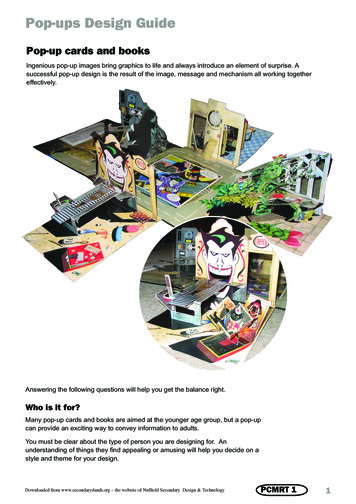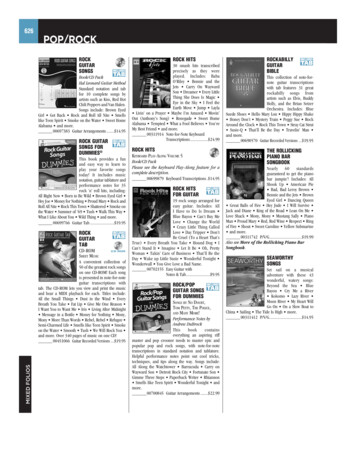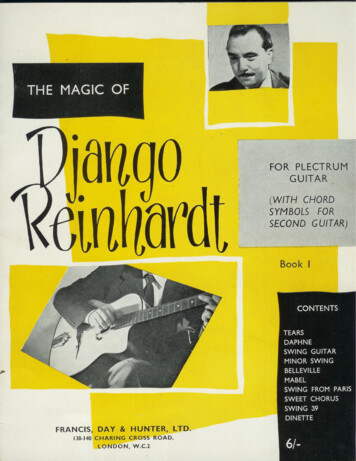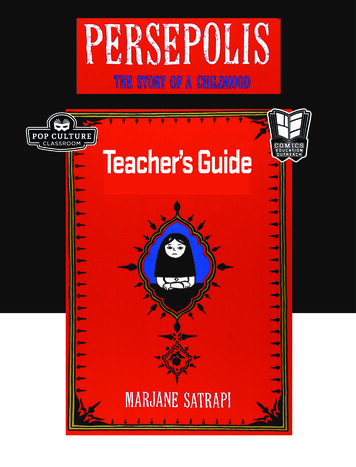
Transcription
Teacher’s Guide
TABLE OF CONTENTSLETTER OF INTRODUCTION . 3PLOT SUMMARY . 4COMICS TERMS/GLOSSARY. 5VOCABULARY . 6DETAILED TABLE OF CONTENTS. 18PRE-READING ACTIVITY: THE STRUGGLE OF THE IRANIAN PEOPLE.19DISCUSSION QUESTIONS. 23PROJECT IDEAS. 26ADDITIONAL RESOURCES. 28TEACHER’S GUIDE 2
PERSEPOLISLETTER OF INTRODUCTIONDear Educator,Ever since television turned American opinion againstthe Vietnam War by broadcasting night after night offallen soldiers arriving at Dover Air Force base, dramaticsteps have been taken to ensure that the Americanpublic feels as unaffected by war as possible. As a result,many modern Americans (who haven’t served, of course)can have a hard time imagining and understanding thepersonal horrors of war. Like the proverbial frog-in-a-pot,we are hard-pressed to notice its slowly growing costsother than the occasional focus on wounded veterans andgrowing deficits.How fortunate for us that Marjane Satrapi was ableto explain her profound struggle so eloquently andrelatably. Her story is a must-read for anyone who lacksa sense of the personal cost of war and revolution. Wesee, through a child’s eyes and mind, the oppression andhorror that rocked a country from the heights of powerdown to the streets and slums. At the same time, we seethe human side of conflict; real people have to navigatethrough their daily lives in the middle of terrifyingevents. In the midst of it all, we see in Marji a free spirityearning for joy in the face of a rather joyless time.When taking your students through Persepolis, Iencourage you to show them the big picture as wellas the fine details. Draw connections between theebb-and-flow of Iranian politics and its effects onthe individual. I also encourage you to draw parallelsbetween the struggles of early 80’s Iranians with morerecent events. The Arab Spring revolutions, as well as theSyrian Civil War, remind us that themes of conflict and3 TEACHER’S GUIDEhuman suffering are evergreen. From a socioculturalperspective, the government corruption that intrudesupon the lives of Marji’s family members can relate to anumber of events in the story of America. Satrapi writesher story to connect with us as personally as possible. Aseducators, we owe it to our students to help them learnfrom and emphasize with the struggles of children justlike them; they need to see that, save for a lucky diceroll from fate, they too would be born in tragic times andplaces.I’m ecstatic that you chose Persepolis for use in yourclass! As you can tell, I believe that Marji’s story isendlessly relatable and will help you build a moreengaging curriculum as well as more socially-consciousyoung people!Looking Forward!Jason Nisavic
PE R S E PO LI SP LOT S U M M A RYIt's 1980 in Iran, and Marjane Satrapi isn't rocking out to Michael Jackson or watchingDallas; she's being forced to wear a veil at her school, which is now segregated. The boys andgirls are separated.This marks the beginning of years of political and religious turmoil in Iran. Marjane'smother and father often attend political protests, kind of like a more violent Occupy WallStreet, and support revolutionaries when they can, including many of Marjane's relatives, likeUncle Anoosh. Uncle Anoosh had fled to the U.S.S.R. because the Iranian regime believed himto be a spy. Uncle Anoosh teaches Marjane much about the world. He also gives her a swancarved out of bread, which is a lot nicer than a swan made from origami paper (because youcan probably eat it). Marji grows very close to Uncle Anoosh, and she takes it very hard whenhe is executed.Because of her mother, father, Grandma, and uncle, Marjane's passions lie in social activism.At a young age, she wants to fix social inequalities and make the world into a place where oldpeople don't have to suffer. That's kind of hard to do when there are bombs falling on Tehranand killing Marjane's friends and family members.Eventually, Marjane's parents decide that Iran is not the place for the daughter they've raised.Marjane is a girl who is headstrong, independent, and outspoken. Her behavior gets herexpelled from school, and mom and pop are afraid that a worse punishment will befall her asthe regime gets stricter. They ship Marjane to Vienna, [and hopefully to a better life ]Source: Shmoop.comTEACHER’S GUIDE 4
CO M I CST E RM S/G LOS SA RYBleed - images that run outside the border of the panelBorder - edge or outline of the comic pageCaptions - contain information about a scene or characterColorist - This person gives the comic color, and add to the weight and vibrancy of the image. The colorist is oftenresponsible for helping set tone and mood via color.Dialogue Word Balloons - contain character dialogue; communication between/among charactersEmanata - text or icons that represent what is going on in a character's headFrame - lines or boxes around a panel(s)Graphic weight - a term that describes the way some images draw the eye more than others, creating a definite focususing color and shading in various waysGutters - space between panels where the reader infers movement and action between panelsPanels - squares or rectangles that contain a single scenePenciler - Primary artist. This person takes the script and draws the comic. They draw the comic in pencil which thengets inked and colored later on.Sound Effect - words that show sound is happeningThought Balloons - contain a character’s thoughtsWriter - The writer writes the story and has the overall vision of how the story will go. They write the dialogue andhow the story will progress.5 TEACHER’S GUIDE
PE R S E PO LI SVO C A BU L A RYPage 3:Islamic – The religion of Islam, a religion that has a lot in common with Christianity and Judaism. People who practiceIslam are known as Muslims.Revolution – A big effort to change the way that a country is run. Revolutions sometimes fail, but when they succeedthey usually destroy and replace the government.Obligatory – Forced, something that must be done.Giddyap – A word that horse trainers have used to tell their horses to move.Page 4:Bilingual – Someone who knows two different languages, like knowing both English and Spanish.Capitalism – The idea that people’s desire for money will make society work fine. The United States and many othercountries use Capitalism but not everyone agrees that it works well.Decadence – Having a lot of fancy and pleasurable things because you are wealthy.Cultural – The things and behaviors that make a group of people special. For example, “Hispanic culture” or “Germanculture.”Page 5:Demonstrations – Large groups of people coming together to demand something from the government.Journalist – Someone who writes and reports important news.Published – To make something public so that everyone can see it.Page 6:Avant-Garde – Adventurous, likes to do things that most people haven’t tried.Prophet – According to some religions, this is someone who has been chosen by god and speaks directly with himabout his wishes.Page 7:Predecessors – People who came before. For example, an older sister would be your predecessor because she was bornbefore you in your family.Disciple – Someone who follows a teacher and tries hard to use what they learn in life.Page 8:Celestial – Holy, coming from god or heaven.Disturbed – Insane, mentally ill.TEACHER’S GUIDE 6
PE R S E PO LI SVO C A BU L A RYPage 9:Puzzled – Confused.Page 10:Unshakable – Something that is firm and can’t be stopped.Page 11:Tyranny – When one ruler controls everything and doesn’t worry about what the people want.Submission – Doing what you are told to do without fighting.Imperialism – When a country fights and takes over lands that are not theirs in order to build a mighty empire.Page 12:Enlighten – To teach somebody about something.Revolutionaries – People who try to make a revolution (pg. 3) succeed.Dialectic Materialism – The idea that animals, people, and society are all growing and becoming better all the time.Material World – All of the things that you can see, smell, taste, touch, and hear.Page 14:Forbade – To tell somebody that they aren’t allowed to do something.Page 15:Shah – Ruler, king.Fanatics – People who are willing to do anything to achieve a goal, including hurting themselves and others.Perpetrated – To do something, usually something bad.Massacre – When a lot of people are murdered.Page 16:Obviously – Clearly, easily seen and understood.Page 18:Degenerate – Fall apart, to get worse.Page 19:Putch – Push, a violent effort to take over.7 TEACHER’S GUIDE
PE R S E PO LI SVO C A BU L A RYPage 20:Republican – A person or group that fights for a republic, a government in which people vote for their leaders and canremove them from power if they abuse it.Secular – Not having or belonging to a religion.Illiterate – When someone can’t read.Bolsheviks – Another word for Communists (pg. 46), people who want everyone to be equal in every possible way.Although it is a noble idea, communism is easily abused by leaders.Page 21:Succeeded – To come after someone.Page 23:Confiscated – When an authority figure takes something away from you.Entourage – A group of people that closely follow and support someone.Diplomas – Degrees that prove that you graduated from school.Cultivated – Educated, carefully grown.Rabble – A disorganized group of people.Intellectuals – People who have a lot of education.Conscience – The voice in your head that tells you what is right and wrong.Condemned – Doomed.Bleak – Grim, not very happy.Page 25:Rheumatism – A disease that is painful and can keep someone from moving properly.Page 26:Poverty – Being poor.TEACHER’S GUIDE 8
PE R S E PO LI SVO C A BU L A RYPage 27:Dynasties – A family of rulers where the title is passed from parent to child.Splendor – Wealth and fame.Page 28:Frivolities – Unnecessary things, stuff you don’t need.Revolting – Gross, disgusting.Page 29:Strictly – Narrow, limited.Page 31:Martyr – Someone who dies because of something they believe or because they are trying to achieve a goal. They areoften celebrated by other people who believe in the same thing.Cadaver – Corpse, someone who has passed away.Royalist – Someone who supports the king.Page 33:Clandestine – Secret.Porter – Someone who carries luggage.Social Classes – Groups that people are put in because of how much money their family has. Some countries force people to stay with other people in their class and some work hard to keep the poor from rising up to a higher class.Page 35:Peasants – Poor people who work for very little money while rich people take advantage of them.Apparently – Clearly, the way that something seems.Page 36:Fiancé – The person that you are about to marry.Jealousy – Wanting something that somebody else has.Clarify – To make something easier to understand.9 TEACHER’S GUIDE
PE R S E PO LI SVO C A BU L A RYPage 40:Declaration – Announcement.Democracy – When the government gives people the power to vote together for what they want.Page 41:Freemason – A member of a secret group that sees itself as bigger than any country or government.Suitable – Something that fits and belongs.Effigy – A symbol for something. “Burning in effigy” means that someone burns a symbol to send a strong message.Departure – To leave.Page 42:Refuge – A safe place.Exiled – Sent away.Pact – An agreement or a contract.Politics – Running a government.Sentiment – The feelings that you have toward someone or something.Page 44:Misfortune – Having bad luck, when a terrible thing happens to you.Phenomena – Unique events, special things that happen.Liberty – The freedom to do what you want.Page 46:Euphoria – A powerful moment of happiness.Communists - People who want everyone to be equal in every possible way. Although it is a noble idea, communism iseasily abused by leaders.Page 49:Flatterer – A person who gives compliments and says nice things to people to make them feel better.TEACHER’S GUIDE 10
PE R S E PO LI SVO C A BU L A RYPage 50:Torturers – People who cause people a lot of pain to punish them or to get them to reveal secrets.CIA – “Central Intelligence Agency,” A government organization in the United States that gathers information aboutits enemies.Nerves – Tiny cells in your body that tell your brain when you are hot, cold, being touched, or in pain.Page 51:Assassinated – Killed.Guerillas – People who fight against the government, usually in secret.Cyanide – A drug that is used to kill people quickly. When some soldiers or spies are about to be captured by the enemy, they sometimes take it and die so they can’t be tortured for their secrets.Page 53:Diabolical – Evil.Page 55:Proclaimed – Announced.Province – A piece of land that belongs to a country.Tormented – Tortured, caused pain.Page 57:USSR – The “United Soviet Socialist Republics,” a Communist empire that used to belong to Russia.Page 58:Executed – Put to death, killed.Shunned – To be sent away from people, when people refuse to be your friend.Page 59:Doctorate – A degree that says you have enough education to be a doctor in a subject.Page 62:Nationalism – A love for your country. Although this can be a good thing, it becomes bad if you start treating peoplefrom other countries unfairly.Page 63:Regime – A government.11 TEACHER’S GUIDE
PE R S E PO LI SVO C A BU
In the midst of it all, we see in Marji a free spirit yearning for joy in the face of a rather joyless time. When taking your students through Persepolis, I encourage you to show them the big picture as well as the fine details. Draw connections between the ebb-and-flow of Iranian politics and its effects on the individual. I also encourage you to draw parallels between the struggles of early .
